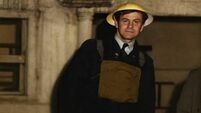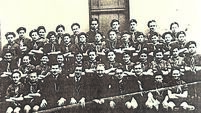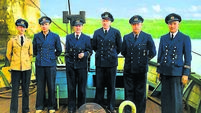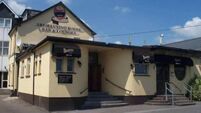Throwback Thursday: My solo boat journey to England, aged 18
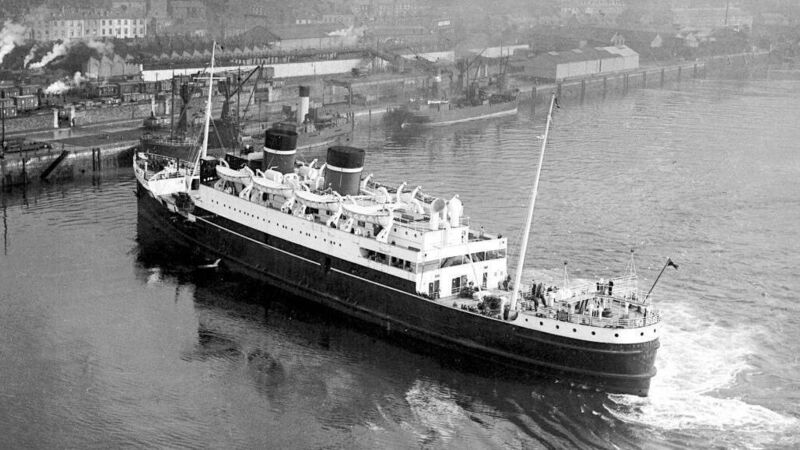
The Innisfallen making a turning manoeuvre on the Lee, opposite Horgan’s Quay, in 1954. Joe Terry’s voyage took place in 1960 and he says the ship would leave Cork at 7pm on Mondays, Wednesdays, and Fridays
We have had a few more marvellous stories from Pat Kelly in Blackrock for this week’s Throwback Thursday, drawn up from the ever-full well of his childhood.
“It brought back so many memories on Cork city in the old days, when you mentioned the horses and bread vans recently, saying that Thompson’s was still using those great Clydesdales in the 1950s,” said Pat.
“However, I had started in Thompsons in 1957, and by then, the former stables were converted to a garage, and the former water troughs were used to wash the vans. The former tack room still had the holders for the horses’ gear though.”
Well, maybe by then they were stabling the horses elsewhere, Pat? I can certainly remember them drawing those long, flat drays through MacCurtain Street in the early 1960s, and seeing them clattering out along Washington Street to the Lee Fields on summer evenings, ridden bareback by the younger lads.
Pat was also pleased with our reference to local grocers’ shops where they would slice the bacon to your exact requirements.
“I remember some shops like Maddens had large Berkel machines for slicing hams, where the slices were as thin as newspaper,” he said.
“There was another large store at the corner of MacCurtain street and Harley Street, where they had a Berkel slicer too. That was directly under the Metropole, and much later was incorporated into the hotel itself.”
Meanwhile, our recent references to the Innisfallen prompted Joe Terry to recall the day he emigrated on our much-loved Cork ferry service – and the attendant fiery send-off from his siblings. – in an evocative and touching account.
“As a child, I often watched the MV Innisfallen from a window of my home in East Cork, as it sailed past on its voyage to Fishguard,” said Joe.
“The vessel, on which thousands of Corkonians emigrated, would sail at 7 pm on Mondays, Wednesdays and Fridays.
“Our family farmstead was a mile north of Ballybrannigan Strand Gap at Coolbay crossroads, in the parish of Cloyne. I was born there in 1942, the second of ten children.
“The south-facing window of that now derelict house, and its view of the regular cargo of emigrants, offered my siblings and me a window on Ireland’s present, and a glimpse of our own futures.
“A younger brother, aged 16, became the first of our family to ‘take the boat’ in the summer of 1960, followed soon after by a sister, aged just 15, to join a convent in London.
“At the time, I didn’t see them depart, as I was working for the Cloyne Mineral Company in Ballinacurra and lodging nearby during the week.”
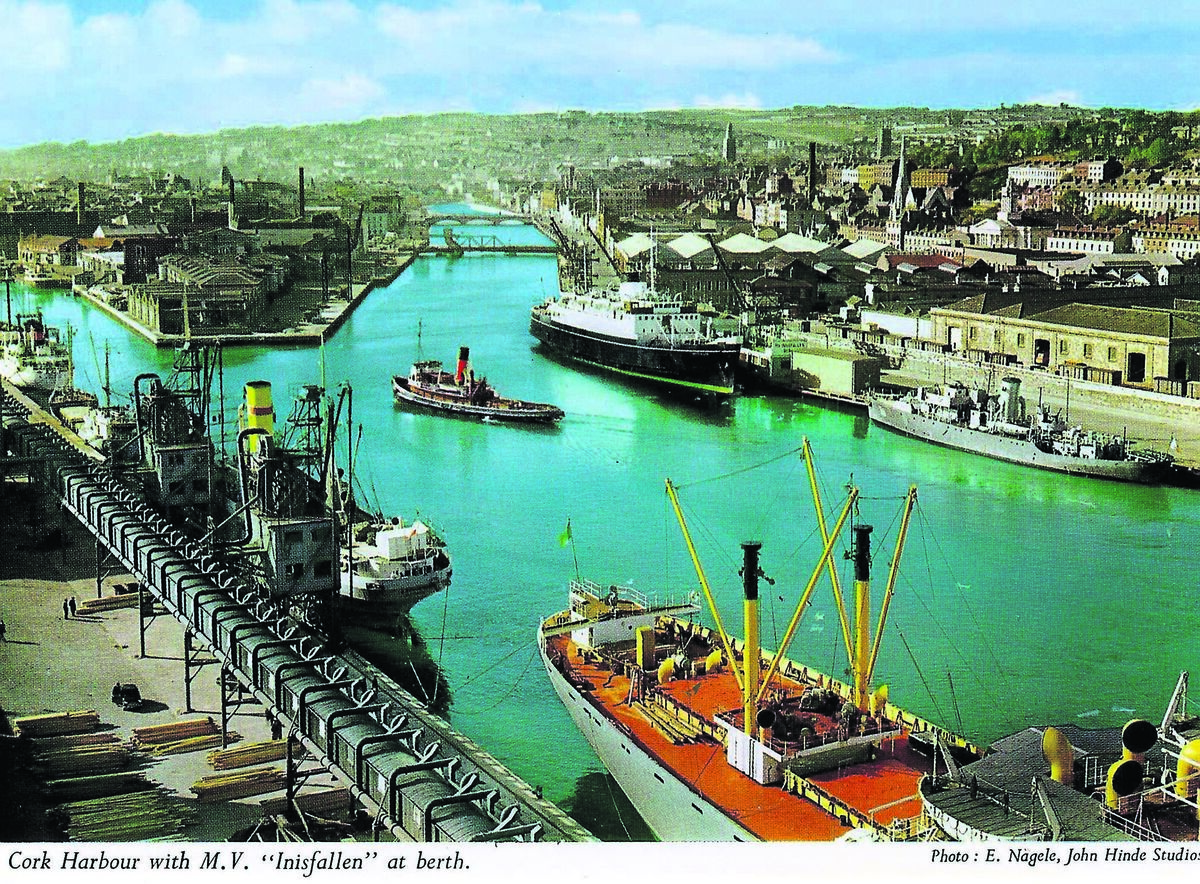
However, Joe continues: “Then, in October 1960, it became my turn to board the Innisfallen for a new life. And my siblings ensured that when I bade farewell to home, I was treated to a bright and beautiful sight that burned its way into my memory and remained there - still bright today, over 60 years later.
“It was a month after the U.S. presidential election TV debate between John F. Kennedy and Richard Nixon, but I had not set eyes on that little piece of history. I had yet to set eyes on a TV set.
“The Innisfallen was berthed at Penrose Quay. I tightened the belt of my overcoat and lifted my suitcase from the cobblestones. Its label, written in bold print with an indelible pencil, was tied to the handle, showing my name and pending lodging address: ‘The Irish Hostel, Camden Square, London NW1’.
“Taking my father’s outstretched hand, I could feel the hardy signs of physical toil, from his occupation as a farmer. ‘Good luck’, he said, and, not wanting to see my moist eyes, I imagine, he glanced at the gangplank leading to the mail boat - passageway to ‘The Promised Land’.
“He had been in this position many times himself, emigrating to England in 1931 and returning to live in Ireland in 1939.
“With shared trepidation, we let go our handshake,” recalled Joe. “He retrieved a partially smoked Gold Flake from a pocket, placed it between his lips, and with unsteady hands struck a match.
“With the hand that wasn’t clutching my four-year-old brother to her bosom, my mother touched my Pioneer badge, her anxious expression showing concern. ‘Send a letter as soon as you get over,’ she urged me. ‘Let us know you are safe.’
“We bade goodbye. Patting my young brother’s head, I told him: ‘Be a good boy for Mammy and Daddy’.
Joe continues the heart-rending account.
“I mounted the gangplank and made my way to the open deck. The ship’s moorings were unleashed from the quay bollards, and we inched away from the quay wall. The sound of the horn blasts and the shuddering from the engine room, vibrating through the steel structure, took me aback.
“Standing at the open deck railings, I kept waving to my farewell party – my youngest sibling with his arms around my mother’s neck as they waved back. The vessel gathered speed, and too soon my well-wishers were out of view.
On the first leg of my adventure, I soaked up the views of prominent edifices from the vantage point of the open deck: Blackrock Castle and, further downriver, Cobh Cathedral.
“Past the mouth of Cork harbour, at Roches Point lighthouse, the Innisfallen turned to port, heading for Fishguard at full speed.
“Then, an hour into the voyage, as day-time changed to an early winter night, my eyes scanned over the waves beyond the coastline. I spotted what I was searching for: the flames of a fire on the milk churn stand a half-mile inland on the road outside my family’s farmyard... my siblings’ farewell to me.
“In my mind’s eye, I saw my mother, only just returned from bidding me farewell at Penrose Quay, preparing supper. My father, now changed into his working clothes and wellington boots, hand-milking the cows.
“The flames from the burning tyres faded into darkness, a cold sea spray moistening my face, as I pondered on my primary school, about four miles from where I was propped against the perimeter railing of the ship’s deck. A century old, the two-classroom school had no electricity, no running water. In winter, it was heated by two open fires, one in each classroom.
“More than once, my cocoa and milk-filled glass bottle, warming in front of the open fire, broke from the heat before I had a chance to wash down my bread and blackberry jam sandwich.”
The remarkably poignant memory continues, as Joe recalls: “The Innisfallen charged on through the turbulent Celtic Sea, and milestone school memories flooded back.
“I’m dressed in boots, long stockings, short corduroy pants, and a matching zipped-up jacket, my hands together under my chin, as I walk across the playground. Under a hawthorn tree, the stone-faced curate sits on a chair, his black Crombie coat covering his soutane, a silk purple stole hanging around his neck.
“I nervously make the sign of the cross, reciting in a slow rhythm: ‘Bless me, father, for I have sinned. This is my first good confession’.
“I consider if a farmhand is listening behind the perimeter fence. In a low voice, I continue: ‘I was fighting with my sisters and brothers... I cursed... I told lies to my mother...’
“As if I am a stranger, the curate shows no emotion, no hint of remorse for when he pinched my cheeks, causing me to cringe from pain, for not knowing my catechism on his school visits. ‘My child,’ he says, ‘I absolve you from your sins,’ before asking me to say three Our Fathers and three Hail Marys.
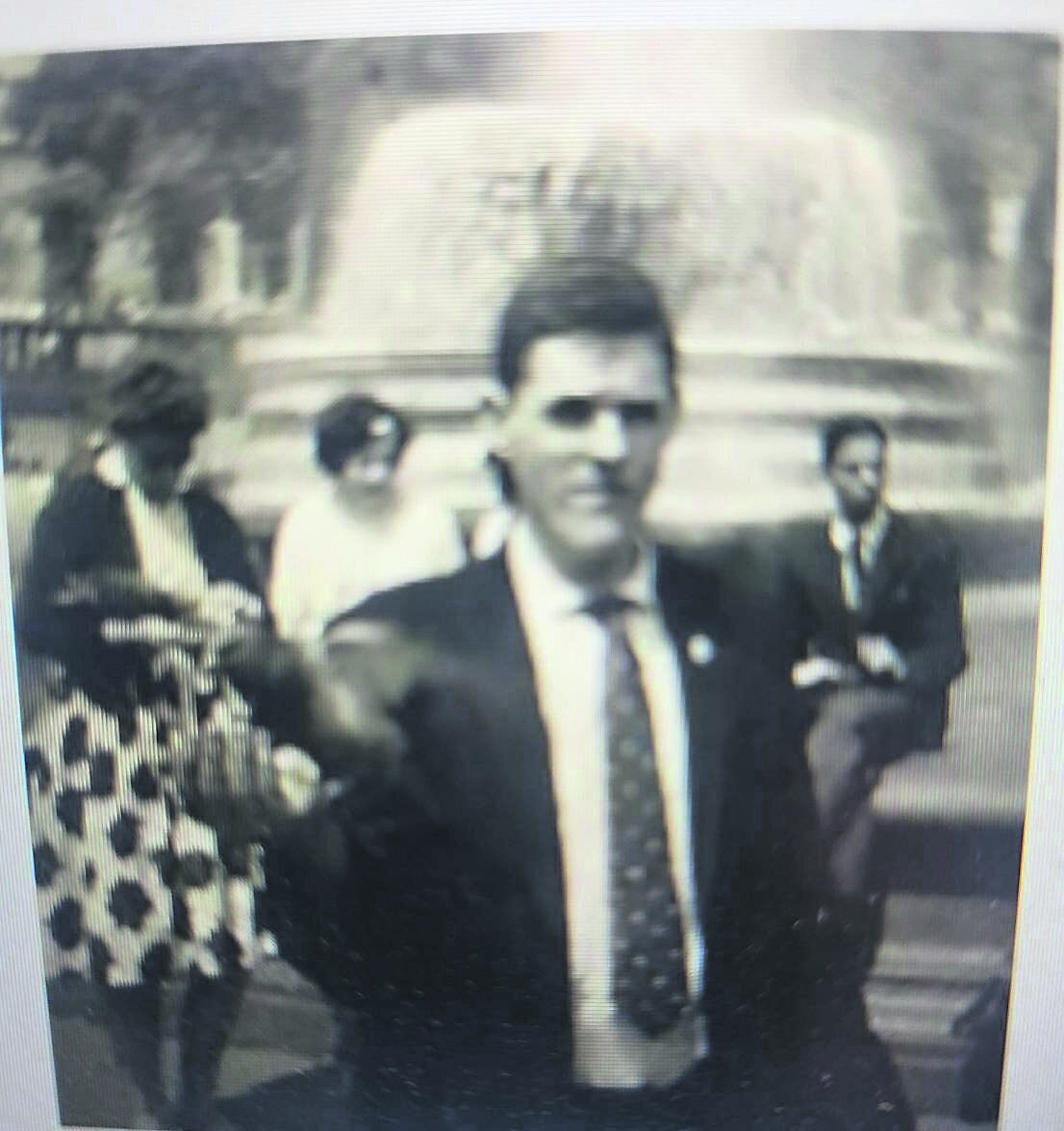
“Rising off my wet knees, I piously walk to face the back wall of the schoolroom to say my penance...”
As that memory of childhood recedes, Joe resumes his memory of that voyage in 1960.
“Arms propped against the railing, my sea legs balanced precariously on the deck, I continue gazing towards the indiscernible coast. The rays of light from the Ballycotton lighthouse came into view, breaking my reverie of the past.
“Through the choppy waves, the Innisfallen relentlessly battled on, into a strong wind, stretching the umbilical cord with my parish. The methodical lighthouse beams faded into the murky distance.
“Alone in my thoughts, I resumed my reflections. The baton of my memory passed to the church in Cloyne, where I received my first Holy Communion and where one time I fainted, having fasted since the previous evening.
“I recalled the church in Shanagarry, the scene of my Confirmation.
“As I remembered the round tower of Cloyne, Christy Ring came to mind, and the time I struck his powerful chest frame with a sliotar during a hurling training session as he guarded goal, numerous stuffed leather missiles coming at him at once. His hurley firmly gripped in his fist, he chased after his minor protégé, I assumed about to unleash his wrath. He shouted at me: ‘Did you mean that?’
“Unfamiliar with his sense of humour, I was about to yell ‘It was a fluke,’ when he tapped my shoulder with his hurley, said, ‘Good shot,’ and rushed back to guard the goalmouth.
“Still on deck, seasickness came over me for the first time in my life; queasiness I’d never experienced, dryness in my mouth. Fishguard was still half a night away!
“Feeling ghastly, I grabbed my suitcase and made my wobbling way inside the hatch, away from the sea spray and howling cold wind.
“Now I learned for the first time the locations of the ship’s stairways and lounges, the purser’s office, the cafeteria bar doing a brisk trade. Weary travellers lay on grubby floors, heads on makeshift pillows, overcoats as blankets. I searched for a vacant seat, hoping to settle down for some shut-eye. But my wretchedness drove me back to the open deck, hauling my suitcase for safe-keeping. Nothing could alleviate my misery
“Agonising hours later, out on the deck, I spotted flickers of lights in the distance... beacons from the Welsh coast! My nightmare abated, just a little.
“Approaching Pembrokeshire, the headland calmed the strong wind. At Fishguard, the Innisfallen, after a nine-hour voyage, docked by the quay.
“Going down the gangplank, I felt a tap on my shoulder and turned around. ‘Your first time crossing the pond, guv?,’ a stranger asked, glancing from my face to my cardboard suitcase. ‘Cor blimey, you’re the colour of death!’
“Nodding without answering, pale and cold, I tried to fathom him out.
“‘Bovril is your only man,’ he says, ‘follow me to the caff.’ In silence, I trailed him, my head pounding, my suitcase seeming much heavier than when I boarded.
“‘Bottle of blew - Bovrils,’ my new acquaintance told a sleepy canteen attendant.
“‘You what?’ she queried. He raised two fingers. ‘One plus one equals two - bottle of glue. Two Bovrils pronto, or we’ll miss the John Wayne for the Big Smoke’. In my wretchedness, I tried to understand the veteran Dagenham Yank’s slang.
“The piping Bovril scalded my throat, but I already felt it settling my stomach. I boarded the train... destination Paddington... the Big Smoke... eight hours away…”
Gosh, Joe, what a wonderfully realistic picture of what emigrating was actually like, way back at the beginning of the 1960s! Thank you for sharing it with us.
The rest of you, do likewise! Send us your own memories. Email jokerrigan1@gmail.com or leave a comment on our Facebook page: www.facebook.com/echolivecork.
